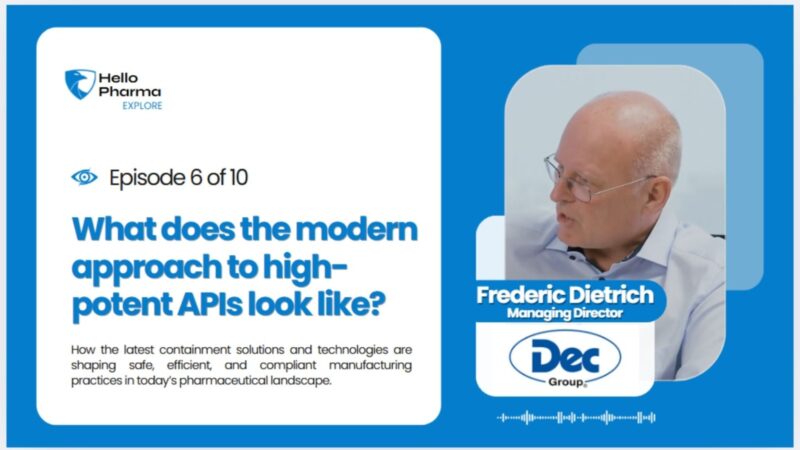The rise of high-potent active pharmaceutical ingredients (HPAPIs) has reshaped the landscape of pharmaceutical manufacturing, presenting new challenges and opportunities for manufacturers. In Episode 6, we explore how modern strategies and technologies are enabling the safe and efficient processing of these powerful compounds.
Mr Frederic Dietrich, Managing Director of Dec Group, joins us to discuss how handling HPAPIs requires a balance of containment, precision, and regulatory compliance. We begin by framing why HPAPIs have become increasingly important. These compounds, often used in oncology, hormone therapies, and targeted biologics, offer significant therapeutic benefits at low doses. However, their potency also demands exceptional care in manufacturing to protect both operators and product integrity.
The conversation explores the fundamental requirements for working with HPAPIs. Mr Dietrich explains how modern containment technologies, such as isolators, glove boxes, and closed transfer systems, provide essential physical barriers to prevent operator exposure. Beyond simple physical protection, these systems integrate advanced engineering controls to maintain environmental conditions and minimize the risk of cross-contamination.
We examine how HPAPI processing also requires robust cleaning and validation protocols. Mr Dietrich shares how manufacturers are addressing the need for thorough decontamination between product campaigns, ensuring that even trace levels of potent compounds are removed to meet strict regulatory standards.
Another important aspect of modern HPAPI manufacturing is process flexibility and scalability. With product pipelines evolving rapidly, manufacturers must be able to adapt containment and process equipment for a wide range of batch sizes and formulations. Mr Dietrich highlights how modular containment systems and process skids allow for this flexibility, supporting efficient scale-up from early-stage development to commercial production.
The episode also considers the role of integrated data systems in HPAPI processing. Real-time monitoring of critical parameters, along with automated control systems, ensures that containment performance and process consistency are maintained throughout production. This data-driven approach helps manufacturers demonstrate compliance with regulatory guidelines while minimizing the risk of operator exposure and product variability.
Looking ahead, Mr Dietrich shares how HPAPI manufacturing is evolving in response to both technological advances and shifting industry demands. As more potent compounds enter development pipelines, manufacturers are investing in advanced containment solutions that combine flexibility with high containment performance. Meanwhile, the move towards continuous manufacturing and digital infrastructure is driving further innovation, allowing companies to optimize HPAPI processing for speed, safety, and quality.
Join us in this episode as we explore how modern containment systems, process engineering, and digital integration are shaping the next generation of high-potent API manufacturing.
For additional resources and expert insights on advanced pharmaceutical manufacturing technologies, visit www.hello-pharma.com.






